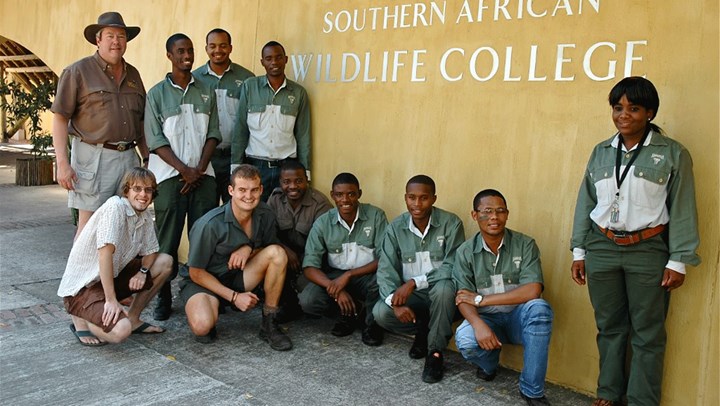
by Karen Mehall Phillips - Sunday, September 11, 2016

Pictured above: DSC executive director Ben Carter with SAWC trainees
If you were asked to name the No. 1 common denominator among all wildlife conservation organizations, what would it be? The answer: They are made up of hunters. From the NRA, Dallas Safari Club and Safari Club International to the Ruffed Grouse Society, Mule Deer Foundation, Ducks Unlimited and every group in between, their membership ranks are filled with hunters all driven to protect America's hunting and conservation heritage and our renewable wildlife resources worldwide. For today's example, let's look at the Dallas Safari Club (DSC).
Earlier this week, the DSC and DSC Foundation (DSCF) announced that grants are once again going directly to funding conservation and anti-poaching activities for wildlife. Topping the DSC list are grants to build and sustain the South African Rhino Protection Programme's K-9 unit that is trained and housed at the South African Wildlife College (SAWC). The tracking dogs are partnered with field rangers to find suspected poachers.
For starters, the DSCF grants will be used to build dog kennels and support operational expenses, including feed and training. Without a K-9 unit, field rangers' success rates are approximately 30 to 1 when compared to ranger teams with tracking dogs. For even more good news, in the near future the SAWC K-9 facility will be available to train rangers from other South African nations.
"The role that the South Africa Wildlife College plays in providing anti-poaching training and specifically the K-9 unit is invaluable to anti-poaching efforts," said DSC Executive Director Ben Carter. "In the long term, the fact the college will be able to train anti-poaching units from other parts of Africa is critical as poaching is a continent-wide problem.”
The K-9 unit is part of the South African Rhino Protection Programme strategy to strengthen rhino conservation efforts. In explaining it is our duty as hunters to promote wild game conservation, DSCF President Jim Tolson said, "Poaching is the most serious threat to African big game. DSCF is proud to put our money on the front lines of this fight."
In just the past five years, by the way, DSC and DSCF have provided more than $5 million for conservation and anti-poaching efforts globally. As a DSC member myself, I know firsthand that just one more example includes the group's partnership with the Houston-based Friedkin Conservation Fund, which, as covered by NRAHLF.org in May, has spent millions assisting Tanzania's Wildlife Division by helping to train, equip and employ anti-poaching teams consisting of 120 full-time field-based rangers.
As for the South African Wildlife College I mentioned, since its establishment in 1996, it has trained more than 14,000 people from 46 nations in natural resource management and conservation. How's that for yet one more example of hunters' dollars at work?
The fact that the hunter-based DSC is providing grant monies in support of K-9 anti-poaching units in South Africa is just one more example of how hunters' dollars fund wildlife conservation worldwide.
E-mail your comments/questions about this site to:
[email protected]
Proudly supported by The NRA Foundation and Friends of NRA fundraising.
